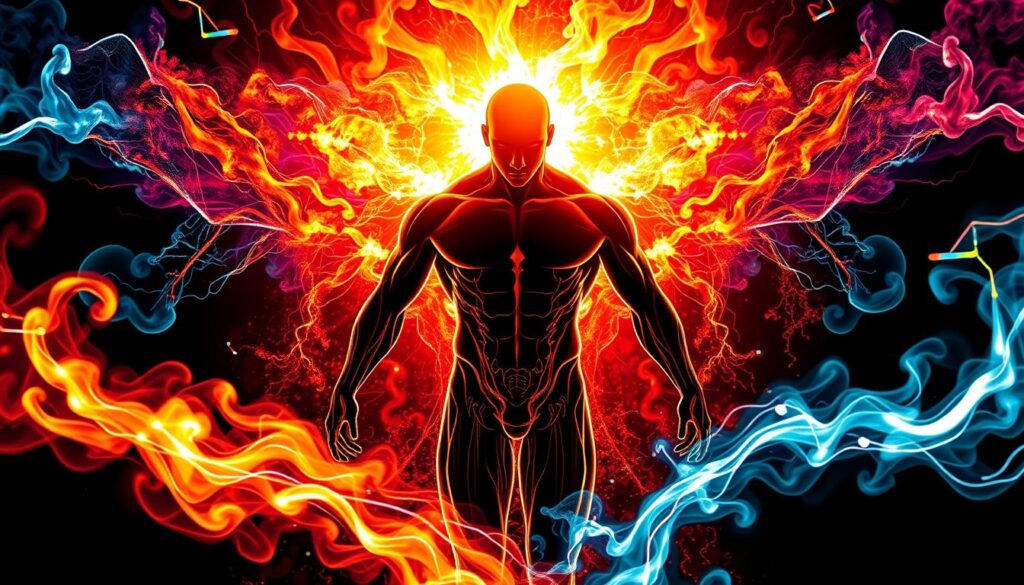who has higher libido male or female?, or sexual desire, has always sparked interest and debate. What causes our differences in sex drive, and does one gender naturally have more desire? It’s important to understand the complexity of human sexuality by looking at gender libido comparison.
This article will dive into what libido is and how it’s viewed. We’ll look at the science and social factors that shape sexual desire differences. From hormones to societal norms, we’ll see what affects libido in both men and women.
Understanding Libido
Exploring libido means looking into many things that affect our sexual desire. This part gives insights into what libido is and what affects it.
Definition of Libido
The American Psychological Association says libido is our sexual drive or desire for sex. Knowing about the psychology of sex helps us understand why some people want sex more or less. Hormones and our mental state are key in shaping our sexual desire.

Factors Influencing Libido
Many things can change our libido. Hormones like testosterone and estrogen are very important. Our mental state, stress, and relationships also play big roles.
Our physical health and some medicines can also change our sex drive. Knowing these helps us see how complex sex psychology is.
Biological Differences in Libido
Exploring the biology of sexual desire shows clear differences in men and women. These come from hormone levels, brain functions, and genes.

Studies reveal that testosterone affects men’s libido more. Women’s desire is influenced by estrogen and progesterone.
A recent study found women’s sexual desire changes more over time. But, in short periods, men and women show similar changes. (This study explored the biology of sexual desire.) This shows that biology isn’t the only factor in women’s libido.
Also, the brain reacts differently to sexual desire in men and women. This brain activity adds to the unique experiences of sexual desire for each gender.
Looking at the male vs. female sex drive, we see hormones, brain functions, and genes play a big role. More research will help us understand human sexuality better.
Hormonal Influence on Male Libido
Male libido is influenced by hormones, mainly testosterone. This hormone is key in driving sexual desire and overall male health.
Role of Testosterone
Testosterone is the main hormone for male sexual health. More testosterone means more sexual desire. It boosts sexual arousal and function.
Changes in testosterone levels can greatly affect libido.
“Testosterone acts as a vital modulator of sexual desire in men, with its effects perceived both physically and psychologically,” explains Dr. Steven Lamm, author of The Hardness Factor.

Psychological Factors
Testosterone is not the only factor in sexual drive. Stress, self-esteem, and mental health also play a role. High stress can lower testosterone and libido.
How a person sees themselves and their confidence in intimacy also matters. A balanced mind is key for good male sexual health.
Hormonal Influence on Female Libido
Female libido is complex and linked to hormonal changes. Hormones like estrogen and progesterone are key. They affect a woman’s sexual health.
Role of Estrogen and Progesterone
Estrogen greatly influences a woman’s sexual desire. It affects both physical and mental aspects of sex. When estrogen levels are high, libido increases. But when they’re low, sexual interest drops.
Progesterone, on the other hand, balances out estrogen’s effects. It can sometimes reduce the desire that estrogen boosts.
Menstrual Cycle and Libido
The menstrual cycle brings big changes in hormone levels. This affects sexual desire. Estrogen peaks during ovulation, boosting libido.
But when progesterone levels rise, libido often falls. These shifts highlight the role of estrogen in sexual health.
Psychological Factors Affecting Libido
Mental health and libido are closely linked. Stress, anxiety, and depression can greatly affect sex drive in both men and women. Feeling overwhelmed or emotionally drained can lower the desire for intimacy and sex.
Body image and self-esteem are key in libido. Negative body views can reduce confidence and interest in sex. Past experiences, good or bad, also shape current sexual desires.
“A healthy mind contributes to a healthy libido. Addressing mental health concerns is key to enhancing overall sexual wellbeing.”
These emotional factors are complex and often linked. Understanding and tackling mental health and libido can improve sexual health and well-being.
Getting professional help, like therapy or counseling, can help manage emotional factors affecting libido. Talking openly with partners about these issues can also improve emotional and sexual intimacy.
Social and Cultural Influences on Libido
Throughout history, how society views sex has greatly influenced our libidos. The culture we grow up in shapes what we think is okay to desire sexually. These norms can make us question our own desires, leading to inner conflicts.
Societal Norms and Expectations
Societal norms shape our views on sex and our desires. For instance, old views say men should want sex more than women. These beliefs can make us doubt our own desires, causing stress or anxiety.
Impact of Media
The media also shapes our views on sex, setting high, unrealistic standards. Ads, movies, and TV shows show too much of a focus on sex. This can make us feel like our desires are not good enough, affecting our self-esteem and confidence.
Libido Variation Across Different Life Stages
Libido changes a lot as we go through different life stages. From being young to getting older, many things can affect it. These include hormonal changes, big life events, and how we live our lives.
Puberty is when many people first feel a strong desire for sex. This is because of big hormonal changes. It’s a time of curiosity and trying new things.
As we get into our 30s and 40s, things like having kids can change our libido. Women might feel their sex drive go up and down because of hormones. Men might feel different too, because of their roles and responsibilities.
In middle age, both men and women might feel less interested in sex. This is because of hormonal changes like menopause or andropause. Health issues and medicines can also play a part.
When we get even older, our libido might go down even more. But this doesn’t mean we stop being interested in sex. It shows that our sex drive can change, and we need to talk openly with our partners.
Impact of Lifestyle on Libido
Lifestyle greatly affects libido in both men and women. Eating well and staying active are key to a healthy libido. Certain nutrients are important for hormone production and sexual health.
Diet and Nutrition
The link between nutrition and libido is strong. Eating foods rich in vitamins, minerals, and antioxidants boosts hormone production for sex. For example, zinc, vitamin D, and omega-3 fatty acids can help improve libido.
A study found that what we eat affects our sexual health. This shows how important a good diet is.
Exercise and Physical Activity
Exercise is also vital for libido. It improves blood flow, boosts energy, and lowers stress, all helping sexual desire. Being fit also lowers the risk of obesity, which can harm libido and sex life.
Adding these lifestyle habits can make intimate life more fulfilling.
Medical Conditions and Their Impact on Libido
Many medical conditions can lower libido, making sex less appealing. For example, diabetes, heart disease, and hormonal imbalances can all play a role. These issues affect libido in complex ways.
Health issues can harm your overall health and lead to sexual problems. This can make life less fulfilling. Also, some medicines for these conditions can lower libido as a side effect.
It’s key to understand how health issues affect sex. Working with doctors to manage chronic conditions can help. This can reduce the negative effects on sex drive.
Talking openly with doctors about sex can help manage low libido. A specialist can provide tailored advice. This can help keep sex life healthy even with chronic illnesses.
Relationship Dynamics and Libido
In any romantic relationship, the dynamics between partners can significantly impact their libido. Understanding how different aspects of a relationship affect intimacy and sex drive is crucial for maintaining a healthy connection.
Communication and Intimacy
Good communication is a cornerstone of any strong relationship. When partners communicate openly, it fosters intimacy and strengthens their bond. This enhanced intimacy and sex drive can boost desire, creating a positive feedback loop. On the other hand, poor communication can lead to misunderstandings and emotional distance, which can diminish one’s libido. Prioritizing honest conversations helps maintain a balanced and satisfying sexual relationship.
Effect of Stress and Anxiety
Stress and anxiety are known to be major disruptors of sexual desire. Relationship stress, whether due to financial problems, work pressures, or personal conflicts, can create a pervasive sense of tension. This stress often manifests as a decreased interest in sex. Similarly, anxiety over unresolved issues, past experiences, or future uncertainties can hinder one’s ability to relax and enjoy intimacy. Addressing these stressors through effective communication, professional counseling, or stress management techniques can help alleviate their negative impact on intimacy and sex drive.
Myths and Misconceptions about Libido
Many people believe in common libido myths that are not true. One big myth is that “men always want sex” and “women don’t enjoy sex as much.” These old beliefs can hurt relationships by setting up wrong expectations.
These myths can lead to bad stereotypes about men and women’s sex lives. It’s important to fight these myths for a better understanding of libido. Knowing that libido is different for everyone, not just based on gender, helps stop the spread of false information. It also makes us see sexual desire in a more detailed way.
Research Studies on Libido Differences
Many studies have looked into why men and women have different levels of libido. They try to understand the reasons behind these differences.
Notable Findings
Research shows that men usually have a higher libido than women. But, this difference can change with age, hormones, and personal experiences. It’s also found that men are often more easily turned on by what they see. Women, on the other hand, might be influenced by their feelings and the situation around them.
Methodological Challenges
There are big challenges in studying libido, especially when comparing men and women. One problem is that libido is hard to measure because it’s personal. Also, what people say in studies can be affected by what society thinks about gender and sex.
Personal Experiences and Testimonies
Sharing stories about libido gives us a peek into the many ways it affects us. These personal views help clear up common myths. They show how stress, relationships, and body changes can impact our libido.
Many stories show that libido is different for everyone. They say there’s no single answer to what affects libido. Just like our lives and feelings change, so does how we see our libido.
By hearing these stories, we can talk more openly about sex and health. It helps us understand the real-life challenges people face. This understanding can lead to more empathy and open conversations about sexual health.
Through these shared experiences, we gain a fuller picture of the factors that uniquely influence each individual’s libido and how they navigate their personal journeys.
Enhancing Libido for Both Genders
Boosting libido can greatly improve your life. You can do this through medical treatments, lifestyle changes, and counseling. It’s important to understand the complex nature of sexual desire for both men and women.
Medical treatments include natural and pharmaceutical options. For men, testosterone therapy is often used. Women might get hormone replacement therapy. Studies also show that some medications and supplements can help increase libido.
Changing your lifestyle is another good strategy. Regular exercise, balanced diet, and enough sleep can boost your sex drive. These habits improve your health and balance hormones, helping your libido.
Psychological counseling is also beneficial for those with low libido due to stress or anxiety. Therapy can help address emotional or psychological issues. This can restore a healthy sexual desire. Understanding the differences in sexual desire between men and women is key, as explained in this article.
Improving your sex drive requires a complete approach. This includes knowing about medical options, making lifestyle changes, and getting mental health support. By exploring these areas, you can find the best ways to increase your libido and enhance your sexual health.
Who has higher libido male or female?
Research shows that male and female libido are influenced by many factors. On average, men say they have a higher sex drive than women. This difference is linked to hormones, especially testosterone, which affects male desire.
But there’s more to libido than just hormones. Over the years, many studies have looked into sex drive in both men and women. They’ve considered things like society, personal life, and relationships. Women’s libido can change due to things like their menstrual cycle, pregnancy, and menopause.
Libido is also shaped by mental health, like stress and anxiety, and how happy we are in our relationships. Even though men might say they have a stronger libido, it’s important to see the bigger picture. How we experience and show our sex drive varies by gender.
Conclusion
We’ve looked into many things that affect sexual desire. This includes biological differences, hormonal changes, and how our minds work. Also, how society views sex plays a big role. Both men and women see changes in their libido at different times in life.
Our research shows that no gender is better when it comes to libido. It’s clear that libido is unique to each person. It’s shaped by hormones, our thoughts, culture, and our relationships. Understanding this helps us see that everyone’s experience is different.
The main point is that libido is complex and varies a lot. By understanding this, we can talk about sex in a more thoughtful way. This helps both men and women in their search for good sexual health.






